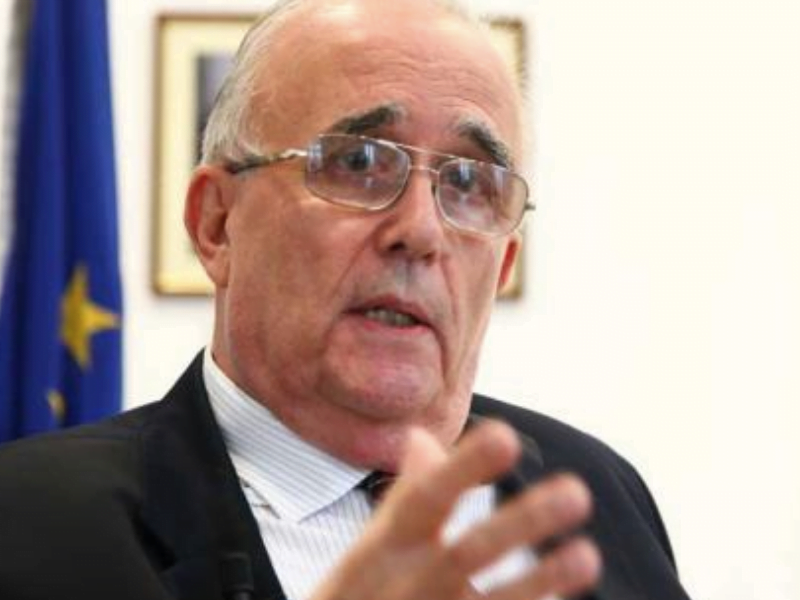Government officials appearing before the public inquiry board looking into the assassination of journalist Daphne Caruana Galizia seem “keen on passing the buck”, Chief Justice Emeritus Joseph Said Pullicino noted in frustration on Wednesday during the testimony of Energy Minister Michael Farrugia.
Said Pullicino was responding to Farrugia’s claim that he was unaware of the existence of any “Kitchen Cabinet” under the Muscat administration – the term was used by Finance Minister Edward Scicluna during the same inquiry when he referred to decisions taken by individuals close to Joseph Muscat.
Farrugia is the third Minister to testify before the public inquiry board after Scicluna and Foreign Affairs Minister Evarist Bartolo.
Despite Farrugia pleading ignorance in this regard, the board, which is tasked with investigating whether the murder could have been prevented, heard how the Minister had been unaware of numerous decisions taken by the government – sometimes even decisions on issues that fell under his responsibility.
The Cabinet was not informed of the snap election in 2017 prior to the public announcement to the public, Farrugia said. The Energy Minister also said Cabinet members were only provided with briefs – the “concept and principles” of large projects, such as Electrogas and the hospitals deal.
Said Pullicino noted that having a Cabinet which does not vet transparency is the “yeast for corruption”.
Farrugia also spoke of incidents where he was not informed about decisions that would have fallen under his remit, such as the controversial reclamation Cafe Premiere when he was Parliamentary Secretary for Planning between 2013 and 2014, and the decision to offer the public a €1 million reward for any solid information on the Caruana Galizia murder, even though Farrugia was then Home Affairs Minister.
Judges question political responsibility taken by Mizzi and Schembri
Farrugia defended the Electrogas project, saying that if any “concrete evidence” of wrongdoing is found, he would be the first to support taking action against it. Ample evidence of wrongdoing has in fact been published.
“Everything that happens which is not in the interest of the government is unacceptable.. there needs to be concrete proof, and then action should be taken,” he said, repeating the line used since 2016 to defend inaction against those involved in Panama Papers.
Despite advocating against corruption during his testimony, Farrugia attempted to justify why former Chief of Staff Keith Schembri and former Minister Konrad Mizzi’s refusal to resign following the Panama Papers scandal.
Farrugia said he had advised Muscat that the two should be made to resign, but he later agreed with Muscat’s decision to keep them while “also paying political responsibility”.The board questioned the political responsibility taken.
When pressed by the board, Farrugia insisted that Mizzi had been removed from his position as deputy Prime Minister and had his portfolio removed. “But despite this, he was still given important projects,” Judge Abigail Lafaro noted.
Farrugia could not pin down exactly how Schembri was held responsible. Farrugia said he deemed Mizzi’s move to open an offshore company was “politically naive”.
Board questions due diligence on hospitals deal
Taking the stand prior to Farrugia, former chairman of the evaluation board for the hospitals deal, James Camenzuli, also claimed ignorance, insisting that he could not recall whether the board had run thorough due diligence on the owners of Vitals Global Healthcare.
Camenzuli defended the board’s choice of VGH, arguing that the company was backed by “serious” companies and bodies. He explained that the other two bidders, Image Hospitals and BSV investments were not compliant for one reason or another. He seemed confused when asked by the board if the other two bidders were “fake fronts”.
VGH’s bid was “comprehensive”, he said, despite an investigation by the National Audit Office slamming the deal as “predetermined” and the result of “collusion”.
Camenzuli also told the board that he did not have a copy of the evaluation report and just handed the copy to Projects Malta’s John Valenzia, William Wade and Aron Mifsud Bonnici – a statement which raised eyebrows among the judges.
Questioned by family lawyer Therese Comodini Cachia about whether Camenzuli was aware at that time that Mifsud Bonnici was the lawyer of disgraced former Energy Minister Konrad Mizzi, Camenzuli said he did not.
“Didn’t you ask?” Comodini Cachia questioned.
“There was no need,” Camenzuli replied.
‘Government must not create obstacles’ to public inquiry
Prime Minister Robert Abela upheld the request for the inquiry deadline to be extended to 15 December, however, seems to not be renewable.
In response, lawyer Comodini Cachia reminded the board that the inquiry took two years to begin, and was created under the obligation of the State to investigate.
It is important for the board to have the “serenity, time and facilities to investigate properly” and it cannot be hindered by lesser amounts of time given by the prime minister she said.
She added that numerous witnesses still need to be summoned and the family, lawyers and the board need the time to prepare for their written submissions after the board concludes its report.
“It requires adequate time and the government must not create obstacles,” she said.












